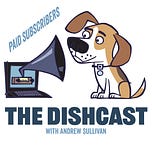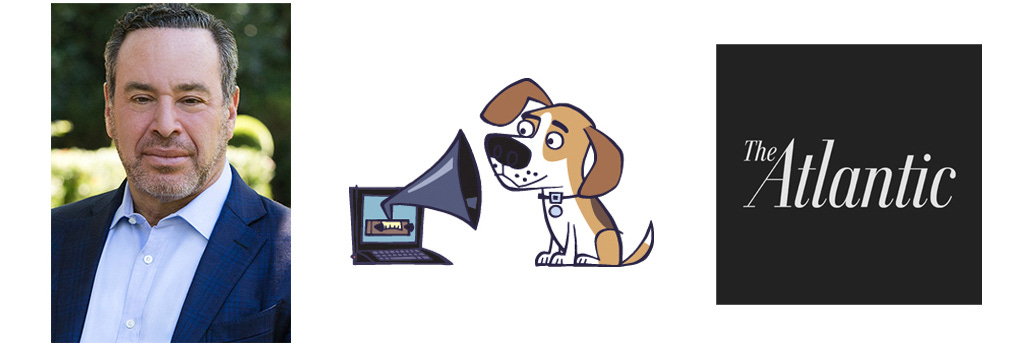David is an old friend, a long-time writer at The Atlantic, and a contributor to MSNBC. He’s the author of 10 books, including Trumpocalypse and Trumpocracy.
You can listen to the episode in the audio player above (or on the right side of the player, click “Listen On” to add the Dishcast feed to your favorite podcast app). For two clips of our convo — on the way Biden has empowered Trump, and the outlook that won the Cold War — pop over to our YouTube page.
Other topics: Frum writing a memoir on being a Cold War baby; raised in Toronto — a city “filled with exiles and refugees” from both sides of that conflict; torture under Pinochet; how global security made Frum a conservative; the Nazis; the distinction between authoritarians and totalitarians; the Stasi in East Germany; the Netflix docu-series on the Cold War; the hubris of the West; the US condoning the coup against Allende; Khrushchev wanting to “bury” the West; JFK scared by Soviet growth; the Cuban Missile Crisis; the genius of Reagan and Thatcher to let the USSR implode; Gorbachev; the US neutralizing the nuclear stockpile after 1989; luring Russian scientists; the enduring influence of the KGB on Putin; the invasion of Crimea; Russia’s historic claims on Ukraine; Putin’s drive to revive an empire; today’s hot war with a nuclear power; the likely fate of Ukraine; how the EU is economically depressed; the migrant crisis there; Merkel’s role; Brexit; China lifting millions from poverty and fueling global trade; today’s cold war with China; the Birther slur; Trump’s wall; threats of mass deportation; asylum seekers vs. illegal immigrants; Biden’s recent executive order; how both Frum and I are immigrants; how the Trump show is boring after a decade; Clinton’s “I’m With Her” vs. Harris dulling identity politics; today problems vs. tomorrow problems; Washington leaving the presidency; Trump’s deranged psyche; and the death of Frum’s daughter Miranda.
Browse the Dishcast archive for an episode you might enjoy (the first 102 are free in their entirety — subscribe to get everything else). Coming up: Musa al-Gharbi on wokeness, Walter Kirn on Republican voters, Bill Wasik and Monica Murphy on animal welfare, Anderson Cooper on grief, John Gray on, well, everything, and Sam Harris for our quadrennial chat before Election Day. After the election we have Peggy Noonan on America, Christine Rosen on humanness in a digital world, and Mary Matalin on anything but politics. Please send any guest recs, dissents, and other comments to dish@andrewsullivan.com.
From a fan of last week’s episode with Michelle Goldberg:
I really enjoyed your conversation with Michelle. I think she pushed you (and you her) in a way that I don’t hear all that often. That’s not to say that you don’t often interview people with whom you have disagreements, but this one was good 'n feisty on both sides.
Another calls it “the best episode you’ve done in several months”:
While I enjoy Michelle’s writing, I would not say I’ve been a fan, but the way she did not give an inch and refused to accept many of your premises made for a fun episode. With no knockout delivered, I’d give it to Michelle on points at the end, but you both gave as good as you got and respectfully heard each other out.
Another focuses on a particular part of the pod:
Kudos for having a dialogue with someone on your left who really challenged you. But I have to admit it was comical to hear you insist on how important it is to you to hear how (or whether) Kamala Harris has changed on various issues:
Which prominent politician spells such changes out in detail? Think of how many politicians have changed their views on, say, gay marriage without detailed explanations.
In contrast to Harris, Trump changes his views on stuff nearly daily, with nary an admission that his views have actually changed, let alone an explanation of why they have changed. Apparently this doesn’t seem to disturb you.
My job as a journalist is to get politicians to answer difficult questions, not to make arguments for politicians to stay silent. It still amazes me that some of my peers in this business take the opposite view: that they are now adjuncts to the Democratic campaign, and should do whatever they can to cover up its weaknesses.
Another listener:
Your interview showed that Michelle Goldberg is very smart, but she lives in a world where her thoughts and viewpoints are never challenged. It was like she had never even considered some of the points you made.
From a former cop:
Thank you for addressing reality without flinching when it came to the impact of the BLM in 2020:
I was a police officer in the NYPD and retired after 20+ years during the 2020 riots. I was no longer was willing to risk my life for those who hate me. Throughout my career I thought I’d seen it all; in 2020, I’d seen enough.
Another listener on 2020:
When you asked her about the BLM protests and the subsequent rise in crime, she said the question was “trollish”. You provided context and asked, “Are we not allowed to talk about that?” She replied, “You can talk about whatever you want, it’s your podcast.” You continued, “Are we not allowed to say it's a problem?” “Who possibly said it's not a problem?,” she asked indignantly. She did! Multiple times, with complete scorn!
She also defended at length the left’s stance on trans issues. When you asked her one of the hard questions about the left’s impact on the gay community, you asked, “Why isn’t that a problem for the gay community?” Suddenly she isn’t qualified to speak on the issue: “I’m not part of the gay community — ask someone else!”
I think the media bubble has completely insulated many center-left writers from the actual debate on, say, transing children before puberty. The fact that this has profoundly damaged the bodies and souls of so many young gay men and lesbians means nothing to them. They take their views, as Michelle says, from whatever the Dem interest groups say, and whatever vibes their lefty friends approve of. And they will not allow a defense of vulnerable gay children to be aired in their pages. From a gay woman:
I was generally pleased by how Michelle Goldberg pushed back on your need for Harris perfection. But I was surprised/not surprised by how uninformed and possibly incurious she seemed about the trans issue. She displayed what seemed like a willful ignorance that aggressive “gender-affirming care” for minors is medically dangerous, ethically unsound, and is being promoted. She seemed unaware that droves of females have decided to de-transition.
As an elderly lesbian, I am thankful that I was not encouraged to change my gender as a youth. Funny how strongly I feel about this, Andrew, but you and I would have been quite vulnerable to this. So, yeah, we get a bit obsessed with it.
Meanwhile, don’t let the perfect be the enemy of the good. I’m voting for Harris, joyfully.
Yeah. I’m a little tired of being told to drop my “obsession” with this — when it is the greatest assault on gay dignity and freedom we’ve seen since the religious right’s ascendance.
From another listener who “enjoyed the pod with Michelle Goldberg”:
I think you are at your best when hosting someone with strongly dissenting viewpoints. When you are debating, it’s far more interesting and informative than when you have a guest that merely echoes the opinions you already share with us on a weekly basis in your column.
Case in point: a few weeks ago, you challenged Eric Kaufmann to stake some positions that you would hate and then he … did nothing of the sort, and the rest of the episode was a somewhat boring love-fest between you two.
The main reason is that it is hard to get left-liberals to come on the show — which is why I’m grateful to Michelle for agreeing. The best pods, I think, are where there is some overlap but also disagreement. On another recent guest:
Thanks for continuing to bring a range of various guests to address different topics on the pod. I have to say that the Michelle Goldberg and Jeffrey Toobin episodes left something to be desired. It wasn’t that they didn’t have potential — the Toobin one had a number of interesting nuggets. But I was reminded of how oblivious (dare I say it?) cultural elites are to the level of bias of mainstream journalism and news, and by extension, objective analysis of our political situation.
My jaw dropped when Toobin responded to your claims about the overall leftward orientation of outlets like MSNBC and CNN. He more or less said, “Yeah, I don’t really see it.” Amazing how clearly he can parse a complex oral argument before the Supreme Court and predict the outcome of cases, but not spot this kind of gross bias. It suggests to me that people of that ilk are so immersed in the political waters that they cannot imagine the world from at least a semi-neutral perspective.
The Goldberg episode also left me a bit incredulous when she wouldn’t concede that Biden had governed more from the left, especially given his historic location in the mainstream of Dem politics. She seemed taken aback by your assertion. Again, it’s hard to conclude anything other than (1) partisan bias creeping into journalistic analysis, and/or (2) that the Overton window had so shifted on what constitutes “moderate governance” that we can now call progressivism the factory default settings, rendering anything like a Trump or even Bush-era policy agenda as “radical” or “ultra-conservative.”
I look for this tendency to continue. Watch the Republicans nominate someone slightly more normie in 2028 and get smeared as a radical. It’s “Romney will put y’all back in chains” all over again.
I have to say that I too am occasionally shocked by the insularity of some of the best writers out there. For me, one of the best things about the Internet was independence from subtle group dynamics among elite journos. It allowed me to question things others wouldn’t or couldn’t, and opened me up to new sources and perspectives. Yes, it’s all turned to shit, but at least I’m no longer going to the White House Correspondents’ Dinner or giving a fuck what David Remnick or Jeffrey Goldberg think.
Another listener just discovered an episode from February:
After having just finished The Pursuit of Happiness, I thought that Jeffrey Rosen would make a perfect Dishcast guest. Then a search of your archives revealed that I somehow missed his appearance earlier this year, and I was delighted to listen for the first time this week. (It even inspired me to read The Tusculan Disputations.) Learning about how far the two of you go back was as enjoyable as your discussion of his book. It was wonderful to hear such a good articulation of the role of reason, virtue, and duty for both citizens and leaders. I’d like to hand every politician and every high school student Jeffrey’s book.
It’s fabulous. A few guest recs:
I recently saw a reader recommend James Davison Hunter as a prospective guest. I couldn’t agree more! He’s brilliant and has written a ton of consequential books dealing with politics, religion, and culture. Very even-handed, but not in a bothsidesism kind of way.
Also, I saw you include a quote from Russell Moore in a recent Dish. Please bring him on. He is a former Southern Baptist denominational leader. He has been the most consistent critic of evangelicalism from within evangelicalism. He’s also the editor-in-chief of Christianity Today, a very nuanced evangelical publication.
Here’s a dissent over a common Dish term:
When you mention “the MSM,” are you referring to specific news outlets or a broader category of media sources? Could you clarify what criteria or characteristics define “mainstream” in your view? You left a legacy outlet before joining, and now your substack rivals the reach you previously had. Many of us turn to independent voices that feel more authentic, trustworthy, or aligned with their values. Newsletters that have curated content not constrained by the editorial oversight or corporate influence perceived in traditional media have basically become “mainstream” in themselves.
If we talk about visuals, network news viewership in the U.S. dropped by 13% (!) between 2020 and 2021. The shift is particularly pronounced among millennials (like me) and Gen Z; we’re increasingly turning to digital platforms like YouTube, Twitter, and podcasts for news and analysis rather than relying on traditional channels like the four major outlets, CNN, WSJ, or Fox News. It reflects how fragmented audiences have become. Rather than relying on the “mainstream” that both leftists and the hard right like to criticize when they generally dislike media being unfair, people now curate their own media diets from a wide array of sources, tailoring content to their specific ideologies and interests.
When we act as if Substack is counterculture, is it anymore? Is there a good definition of what a “mainstream media” outlet even is today?
Those are some very good points, and I should probably think this through some more. What I largely mean by “MSM” is what we’d call the “legacy media,” the largely liberal and now left institutions that recruit from the top colleges, and remain the big names. NYT, WaPo, NBC, MSNBC, and CNN are the core. They are all committed to DEI in hiring and coverage; they have all internalized critical race, queer and gender theory, and see the entire world through these lenses.
And yes, there has been a healthy reaction to this, of which Substack is a critical part. Sadly, a lot of the right media — Fox, et al. — has disappeared into a paranoid vortex of delusion, with only a few retaining credibility. But there are signs of a small liberal revival at the NYT and the opinion pages of the WaPo.
On last week’s coverage of David Reich’s new study, many readers are dissenting. The first:
You kick your column off by telling us that race is “obviously” a social construct. You then spend the next four paragraphs explaining how racial characteristics are anchored in genetics — revealing race to be pretty much the opposite of a social construct.
Listen to this episode with a 7-day free trial
Subscribe to The Weekly Dish to listen to this post and get 7 days of free access to the full post archives.












